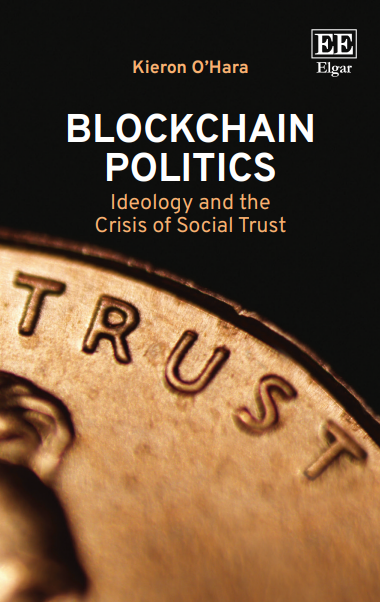How Brexit Was Scuppered By a Lack of Trust
Posted on 21/04/25 in Politics, Trust

In an extract from my forthcoming book Blockchain Politics, I describe how social and political trust are essential for cross-party, multi-electoral projects which chart a nation’s future and resilience. The obvious example is Brexit. I should declare my own position. I voted Remain, more because of the risks of leaving, than from any great love of the EU. I also opposed a referendum, an utterly flawed way of making decisions and establishing consensus. But, as one was held and the result pretty clear, the decision to leave had to be respected, if politics was to be seen as a trustworthy profession. A second referendum should have been out of the question.
Where trust has broken down, politics can’t properly be done, just as wars cannot be won if no-one ever surrenders. Brexit is one of the totemic issues dividing Puritans and Peasants, and the botch that was made of it was entirely down to the lack of trust and trustworthiness in polarised British politics. The getting-things-done political task was to craft a post-EU project that would build on the advantages of returned sovereignty, while retaining good relations with the EU, the UK’s nearest neighbour, largest trade partner, and closest geopolitical ally.
Why was it so bungled? I would say the lack of trust: between Leavers and the Remainer establishment; between Remainers and voters; between the Conservative Party leadership and its troops; within the Tory leadership itself; between the Tories and the Labour Party; between the Labour leadership and Parliamentary Party; between the Parliamentary Labour Party and the membership; within the Remain group. For the Parliamentary mess, see Wager. The EU didn’t help; its sole aim was to punish Britain for leaving, thereby making a mockery of Habermas’ argument that the Lisbon Treaty democratised the EU by making it possible to leave.
Article 50 was triggered too early by Remainer Theresa May because she felt she had to demonstrate her trustworthiness to the Leavers in her party. She tasked figures she did not trust, David Davis, Liam Fox and – demonstrably the least trustworthy politician around – Boris Johnson, with carrying out the negotiations. Davis and Johnson reneged on that trust by failing to negotiate seriously and resigning the moment a withdrawal agreement looked on the cards. May demonstrated her lack of trust in the three by sidelining them with officials. The cross-party Parliamentary Remain majority, egged on by the wretched Speaker John Bercow, got absolutely everything wrong because it was unable to unite in a purposeful coalition, making Johnson the only plausible Prime Minister by the Summer of 2019. This was a triumph of beggar-thy-neighbour politics and, in Euro-lingo, un petit-dejeuner d’un chien.
What might have happened, had trust not been on short rations? The political class might have pulled together, not in agreement, but behind a democratic and constitutional process. Those parties with large Leaver factions should have committed to leaving. The next election was due in 2020, giving each party time to work out a precise negotiating position to put before the electorate in its manifesto. Labour might have wanted to keep close to the EU for its social benefits, while the Tories might have promoted free trade, and UKIP could aim to cut immigration, for instance. Consistent Remainer parties like the Liberal Democrats or Scottish Nationalists might have decided to campaign for a second referendum or even to reverse the decision. It would have been a struggle in most parties to produce such manifestos, but groups of people who trust each other can make the necessary compromises.
Election called, manifestos presented, a new Parliament would have a mandate to trigger Article 50 and negotiate something specific (or to call the whole thing off). The meaning of Brexit, unclear during the referendum, would have been decided by the election, and the project would be the major task of that Parliament. The EU, wanting to punish Britain, would doubtless still have negotiated in bad faith, but the UK would at least have had clear goals and a mandate to push for them.
There are many other such areas. The response to COVID is an obvious one, which involved a complex trade-off between citizen trust of government, citizen trust of science, government trust of science and scientists, scientists’ trust of government, everyone’s trust of the media, as well as the Puritan/Peasant divide which in some countries even politicised the pandemic suppression measures, and on top of that the influence of social media and misinformation, and on top of that issues about the reliability of statistics in some countries, and on top of that the point that levels of uncertainty for policymakers were extraordinarily high. A trusting political culture would at least allow coordinated and depoliticised responses (although even then they may be based on erroneous science).
 Kieron O'Hara
Kieron O'Hara